
Klaus Schulze was a German electronic music pioneer, composer and musician. He also used the alias Richard Wahnfried and was a member of the Krautrock bands Tangerine Dream, Ash Ra Tempel, and the Cosmic Jokers before launching a solo career consisting of more than 60 albums released across six decades.
Krautrock is a broad genre of experimental rock that developed in West Germany in the late 1960s and early 1970s. It originated among artists who blended elements of psychedelic rock, avant-garde composition, and electronic music, among other eclectic sources. Common elements included hypnotic rhythms, extended improvisation, musique concrète techniques, and early synthesizers, while the music generally moved away from the rhythm & blues roots and song structure found in traditional Anglo-American rock music. Prominent groups associated with the krautrock label included Neu!, Can, Faust, Tangerine Dream, Kraftwerk, Cluster, Ash Ra Tempel, Popol Vuh, Amon Düül II and Harmonia.

The Catalogue is a box set consisting of the eight albums by German electronic music band Kraftwerk that were released from 1974 to 2003. All albums are digitally remastered, with most of the cover art redesigned, including rare photographs in the liner notes that were not part of each album's original release.

Emperor Tomato Ketchup is the fourth studio album by English-French rock band Stereolab. It was released on 18 March 1996 and was issued by Duophonic Records and Elektra Records.
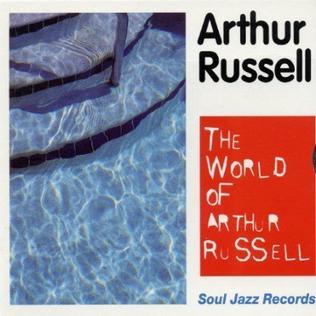
The World of Arthur Russell is a compilation album by Arthur Russell, released in 2004 on Soul Jazz Records.

That's My Beat is a compilation album by hip hop–electro funk musician Kurtis Mantronik and features tracks selected by Mantronik and cited as influences to his work with his hip hop/electro funk group Mantronix. The album was released on the Soul Jazz Records label in 2002.
Soul Jazz Records is a British record label based in London. Outside of releasing records, the label also publishes books, occasionally films and performs as a DJ set. The music releases labels from a variety of genres, including reggae, house, hip hop, punk rock, jazz, funk, bossa nova and soul.
Klaus Röder is a German musician and music teacher. Born in Stuttgart, Germany, he currently lives and teaches in Langenfeld, Rhineland, Germany. Röder is married and has three children.
Sky Records was a Hamburg, Germany-based independent record label specializing in krautrock/Kosmische Musik and electronic music. Some of their releases could be classified as progressive rock or art rock, experimental music, industrial, ambient, or new age. No new releases appeared after 1998.

Asmus Tietchens, who also records under the monikers Hematic Sunsets and Club of Rome, is a German composer of avant-garde music. Tietchens became interested in experimental music and musique concrète as a child, and began recording sound experiments in 1965 with electronic musical instruments, synthesizers and tape loops. In the 1970s he met producer Okko Bekker, and the two formed a decades-long partnership. Peter Baumann heard a recording of Tietchens' music and offered to produce an album; the result was Nachtstücke, Tietchens' 1980 offering on Egg Records. His early recordings feature more accessible synthesized music, but beginning with Formen Letzer Hausmusik, his 1984 release for Nurse With Wound's label United Dairies, he began moving toward more abstract sound collages. He has taught acoustics in Hamburg since 1990.
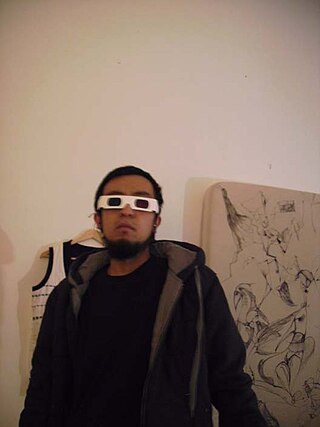
Kohei Matsunaga is an electronic musician and draughtsman born in 1978 in Osaka, Japan, currently residing in Osaka and Berlin, Germany.
Experimental rock, also called avant-rock, is a subgenre of rock music that pushes the boundaries of common composition and performance technique or which experiments with the basic elements of the genre. Artists aim to liberate and innovate, with some of the genre's distinguishing characteristics being improvisational performances, avant-garde influences, odd instrumentation, opaque lyrics, unorthodox structures and rhythms, and an underlying rejection of commercial aspirations.

E.M.A.K, or Elektronische Musik Aus: Köln, was a German band and production collective based in Cologne in the 1980s. It produced experimental minimalist electronic dance and ambient pop music.
Bureau B is an independent record label, music publisher and booking agency from Hamburg, Germany, founded in 2005 by Gunther Buskies as a sister label to Tapete Records. The label releases varieties of electronic, free-spirited music, with the spectrum ranging from pop to avant-garde. The label has amassed an extensive catalogue of reissues and new productions, including classics from the genre of electronic music in the 1970s and early 1980s popularly classified as Krautrock, alongside new recordings by such formative artists as Faust, Kreidler, Roedelius, Tietchens, Moebius.
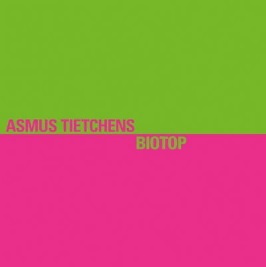
Biotop is the second album by German electronic musician Asmus Tietchens, released in 1981 on Sky Records. Tietchens recorded the album at Audiplex Studios with producer and mentor Okko Bekker, who is credited as Rokko Ekbek. Departing from the musical style of the musician's debut album Nachtstucke (1980), Biotop contains sixteen short electronic pop tracks that are characterised by their immediate nature but unusual synth lines, tones and melodies. Bekker compared the music to radio time signals. Indeed, the liner notes state the album was performed by Das Zeitzeichenorchester, which translates to The Time-Signal Orchestra, although in reality this is an alias for Tietchens, the album's only performer.
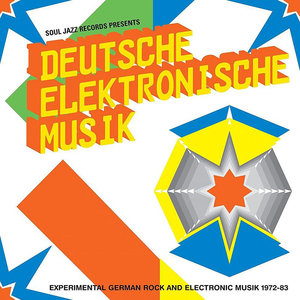
Deutsche Elektronische Musik is a compilation album of German electronic and rock music released in 2010 by Soul Jazz Records.

New York Noise is a 2003 compilation album released by Soul Jazz Records. The music of the album compiles features the genre-bending music from New York City released during the late '70s and early '80s, ranging from no wave to mutant disco to hip-hop to art funk among others. On its release, it received positive reviews from AllMusic, Pitchfork Media and Rolling Stone. A new version of the album with several track re-arrangements was released in 2016.
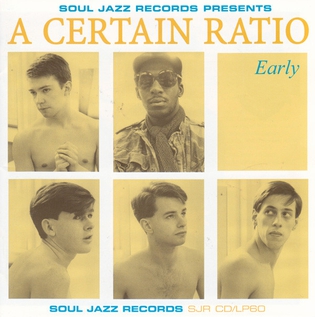
Early is a 2002 compilation album by the English post-punk band A Certain Ratio.
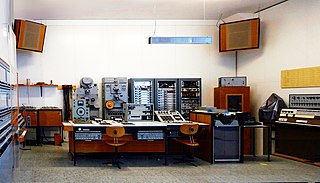
The Siemens Synthesizer was developed in Germany in 1959 by the German electronics manufacturer Siemens, originally to compose live electronic music for its own promotional films.

Deutsche Elektronische Musik 3 is a 2017 compilation of krautrock music released by Soul Jazz Records.














